Dr. Cornel West, an independent candidate running in the 2024 presidential election, has qualified for the ballot in Virginia’s general election after initially being denied access. The Virginia Department of Elections sent a letter to West’s campaign stating that after review, they had reconsidered their decision and West’s name, along with his running mate Dr. Melina Abdullah, would appear on the ballot. The issue with their initial denial was related to challenges around the validity of their elector forms, which caused their paperwork to be rejected by the department.
The West-Abdullah campaign confirms that they have received the letter from the Department of Elections and will now be on the ballot in Virginia. This development allows Virginia voters to choose a candidate who represents their values, according to a spokesperson for the campaign. West will be joining several other candidates on the ballot in Virginia, including former President Donald Trump, Vice President Kamala Harris, and candidates from other parties. Independent candidate Robert F. Kennedy has removed his name from the ballot in Virginia after announcing the suspension of his campaign and endorsing Trump.
The West-Abdullah campaign has made efforts to gain ballot access in several battleground states, including Michigan, Wisconsin, North Carolina, and Georgia. Although Virginia may not be considered a battleground state, the Trump campaign has attempted to make it competitive through various campaign rallies. Despite President Biden winning Virginia by a significant margin in the 2020 election, West and Abdullah could potentially impact the outcome of the presidential race in these states. However, there have been challenges in gaining ballot access in some states, such as Arizona and Nevada, where the campaign missed deadlines to submit necessary paperwork.
In Pennsylvania, the West-Abdullah campaign was denied ballot access after losing a legal challenge. The challenge revealed that 14 of West’s 19 presidential electors did not have the required affidavits, leading to their rejection by the state. The campaign has stated that they are pursuing a federal court complaint in response to these challenges, believing that the current system unfairly limits their First Amendment rights. Despite these setbacks, the campaign remains determined to continue their efforts in Pennsylvania and other states where they have faced difficulties in gaining ballot access.














